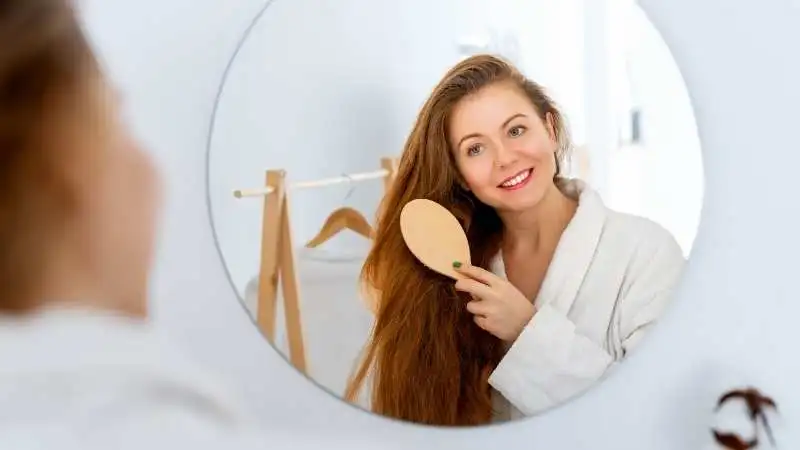Thinning hair is a common issue that can impact anyone due to factors like aging, chemical allergies, illnesses, and poor nutrition. Though we can’t alter hair follicle texture, there are ways to make hair look thicker and reduce breakage and loss. So, how to make thicker hair? Here is key knowledge that may be useful to you!
The main causes of hair thinning
Hair thinning can result from lifestyle choices, genetic factors, or a combination of both. Additionally, specific medical conditions may contribute to the onset of thinning hair.
Habits in your daily life that can impact hair thinning and loss may comprise:
- Excessive Hair Treatments: Overdoing color treatments, perms, and relaxers can contribute to hair thinning.
- Harsh Hair Products: The use of strong-hold hair sprays and gels may adversely affect hair health.
- Tight Hairstyles: Pulling hair tightly in updos or ponytails can lead to breakage over time.
- Nutrient Deficiency: Inadequate intake of essential nutrients like iron and folic acid can impact natural hair production.
- Chronic Stress: Prolonged stress, elevating hormones like cortisol, may trigger conditions such as telogen effluvium, resulting in hair loss and extended resting phases for hair follicles.
Thinning hair can be inherited or linked to medical conditions. You may experience it if you:
- Are undergoing hormonal changes.
- Have a vitamin D deficiency or lack other essential vitamins and minerals like riboflavin, selenium, and zinc.
- Stopped taking birth control pills.
- Have immune system deficiencies.
- Lost a significant amount of weight rapidly.
- Currently undergoing therapy for an autoimmune condition.
- Suffer from a skin disorder or infection.
Recommended treatments and remedies for thinning hair
Addressing thinning hair at home is a possibility to explore. Here are 12 options to consider, but it’s advisable to consult with your doctor beforehand.
1- Scalp massage
A wallet-friendly way to make thicker hair is through scalp massages. It’s free and, when done right, harmless. During your hair wash, gently use your fingertips to apply pressure on your scalp, boosting blood flow. For added benefits, consider a handheld scalp massager to help eliminate dead skin cells.
2- Essential oils
Essential oils, derived from plants, are commonly used in aromatherapy and alternative medicine. However, there isn’t sufficient evidence to support their effectiveness in treating baldness or thinning hair. If you choose to try this treatment, ensure that the essential oil is diluted in a carrier oil like coconut or jojoba. Before use, test a small amount on your arm and wait 24 hours for any potential reactions. Watch for redness, irritation, hives, or a rash, as they may indicate an allergic response.
3- Anti-thinning shampoo
Anti-thinning shampoo operates on a dual basis. Initially, these products enhance hair volume, to make hair thicker, which is particularly beneficial for those with naturally fine or thinning hair. Moreover, shampoos designed for thinning hair incorporate vitamins and amino acids to foster a healthier scalp. For optimal results, it’s recommended to follow the usage instructions for these products.
4- Multivitamins
Having healthy hair is closely tied to your overall well-being. Poor nutrition or specific eating habits can impede the growth of new hair from follicles. A simple blood test can identify any nutrient deficiencies. If you lack essential nutrients, your doctor may suggest a daily multivitamin. For robust hair growth, ensure your diet includes iron, folic acid, and zinc. Consider gender-specific supplements that cater to these needs.
5- Minoxidil
Rogaine, also known as minoxidil, is an FDA-approved over-the-counter solution for hair loss. Apply it to your scalp twice daily, and over time, it may to make hair thicker in areas with thinning. Choose between liquid or foam based on your preference, or get an oral prescription from your doctor. Results may take up to 16 weeks, so consistency is key for visible effects.
6- Finasteride
Propecia, or finasteride, is a prescription pill for male hair loss, distinct from topical solutions like minoxidil. It’s important to note that individuals planning or capable of pregnancy should avoid this medication due to potentially serious side effects. However, for postmenopausal females, studies indicate it could be an effective treatment and is often prescribed by some doctors.
7- At-home laser therapy
Dermatologists and skin specialists often use laser therapy, but some FDA-cleared products are now available for home use. These at-home laser devices aim to make hair thicker and promote hair regrowth, though noticeable results may take a few months.
Can a hair transplant procedure fix thinning hair?
Addressing thinning hair, hair transplantation stands out as a highly effective solution. Through methods like FUE and FUT, it’s possible to regain your hair’s natural thickness, even for those with longer hair, making these procedures the preferred choice for many seeking hair restoration.
Hereditary factors, like male or female pattern hair loss, are common reasons for hair thinning. A significant majority, 81.1%, of hair transplants address genetic hair loss. If your thinning hair is inherited, considering hair transplant surgery could be a suitable option for you.
Enhancing to make hair thicker is achievable through hair transplant procedures. Weak hair follicles are replaced with stronger ones, promoting vibrant growth. The transplanted roots adapt to their new environment, gradually gaining thickness over time in harmony with the body.
An effective hair transplant provides a natural and healthy appearance, promoting the growth and thickness of your hair. It enhances the clarity of hair follicles and reduces the likelihood of future loss.
Hair transplantation procedures are on the rise, with success influenced by clinic equipment, experienced doctors, and proper methods. Key stages include selecting the right method and donor area. When these stages go well, to make hair thicker is likely.
What should I do when considering hair transplant for my thinning hair?
If you’re troubled by hair loss and contemplating treatment, it’s crucial to consult with a seasoned hair loss specialist for an assessment and expert advice. Should you opt for hair transplantation, ensure you select a trustworthy clinic and surgeon. We recommend reviewing before-and-after photos and reading hair transplant reviews from your chosen clinic to gauge the potential results.
Schedule a complimentary consultation at Kardelen Clinic to explore hair transplant turkey options for your hair concerns.




